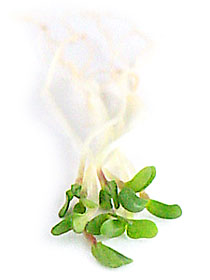
They became popular in the 1970s and since have become a salad bar staple. But somehow, sprouts just haven't been able to shake their fad food reputation, until now at least. Certainly they add flavor as well as numerous vitamins and minerals to meals. But it's the recent definitive research establishing some sprouts' cancer-protecting properties that may finally push them to the center of the dietary stage.
Last year, reports from Johns Hopkins School of Medicine indicated that broccoli sprouts may offer protection against cancer. This good news, which created a frenzy when it was announced, overshadows a recent advisory from the U.S. Food and Drug Administration warning health-compromised groups to avoid raw alfalfa sprouts. Are sprouts a magic bullet or a health threat? There's no simple answer, but here we describe some recent research on sprouts and how you can get the maximum health benefits. Growing your own sprouts is a simple way to add fresh greens to your diet, especially in winter.
Seeds for Sprouts
Seeds of many different vegetables can be sprouted, but the most popular are green leafy kinds such as alfalfa, broccoli, cabbage, clover, kale, radish, and onion. All sprout readily in water and are best eaten soon after the first leaves (cotyledons) sprout. These are best enjoyed raw because they are so tender and delicate. Other tasty seeds to sprout include various kinds of beans and lentils: adzuki, kidney, lentil, mung, pinto, and soy. They are best harvested before leaves emerge and are generally eaten cooked.
Most vegetable seeds germinate in three to six days. Flavor is variable, but assume it will be milder than the mature vegetable. Beans require only one to three days to produce a root, but some seeds, such as onion and garlic, may need up to two weeks to produce edible sprouts.
Seed companies and health-food stores sell many kinds of sprouting seed. Sprouting seed differs from garden seed in that it has not been treated with fungicides. Generally, it also germinates well, is open-pollinated, and is cheap. However, any untreated seed can be sprouted. Use seeds with the highest germination rates because ungerminated seed is more likely to spoil during the sprouting process.
If you want to sprout a specific variety for its taste, you'll probably have to buy seed intended for the garden. Just make sure it is not treated. Varieties well suited to sprouting include 'Saga' broccoli, 'Red Russian' kale, and 'China Rose' radish.
For sprouts of kidney, mung, and other common beans, use fresh, whole dried beans from the grocery store.
Seed mixes. To meet consumer demand, some retailers have created mixes of seeds that combine well and produce more flavor variety in a single harvest. Mixes may also take advantage of differing sprouting times to extend the harvest. In the latter case, pluck off and enjoy the longest sprouts first while the others continue growing.
There's no secret to creating a seed mix. Some good ones include alfalfa, radish, and clover; broccoli and kale; or mung beans and lentils. Experiment with proportions until you find an appealing combination.
Basic Sprouting
The method for successful sprouting is the same whether you use a traditional canning jar or cheesecloth bag, or a fancy European sprouter. Most packets of sprouting seed include specific instructions, but here are guidelines for sprouting in a 1-quart jar.
Place 1 to 2 tablespoons of seed in a medium bowl. Remove any loose hulls and visible debris, and rinse seed several times to wash away any surface contaminants. Soak overnight in tepid water to enhance germination. After soaking, smaller seeds, such as alfalfa and broccoli, can expand up to four times in volume, but larger seeds, such as mung bean and lentil, will only double in size.
Place the presoaked seeds in a clean jar covered with fine mesh screen or cheesecloth. (If you use a canning jar, use the screw lid to hold the screen in place; otherwise a rubber band will do.) Fill and drain the jar with cool water several times, then prop the jar top down at a 45-degree angle. Using cool water, rinse and drain the sprouts two or three times a day, until roots sprout for bean seeds and cotyledons emerge for vegetable seeds.
Best conditions for sprouting are temperatures from 60 to 75oF, high humidity, good air circulation, and frequent rinsing to deter spoilage. Most sprouts do well in indirect light, but bean sprouts prefer the dark.
To sprout different kinds of seeds simultaneously, consider using a multilevel plastic seed sprouter. Mail-order seed companies offer several kinds. These have two or three levels, a watering tray at the top, and a water collection tray on the bottom. Because water flows down through all the levels, one rinse cleans all the seeds. If you select a model with a broad, flat germination tray, you can harvest the tallest sprouts first, leaving the others undisturbed until they are mature.
Harvesting and storing
As a practical matter, you can consume vegetable sprouts for several days after harvest, so long as they haven't developed a sour odor, wilted, turned yellow, or become slimy. To get maximum health benefits from broccoli sprouts, consume them three to four days after they start to germinate and before they have green leaves. Use bean sprouts when the roots are plump and crisp, and before the cotyledons appear.
Before serving sprouts, wash and rinse away the seed hulls. Refrigerate harvested sprouts, and rinse them daily to preserve freshness. Most sprouts can be stored safely for up to a week.
Alfalfa Advisory
In response to recent E. coli and Salmonella outbreaks, last August the U.S. Food and Drug Administration issued an interim advisory recommending that anyone at high risk for severe food-borne illness -- namely, small children, the elderly, pregnant women, and anyone with a compromised immune system -- should not eat raw alfalfa sprouts, especially those grown commercially.
The problem is caused in part by the way seed is harvested: even seed sold for sprouting is not cleaned sufficiently for consumption as food. All seed may contain bacteria that multiply to dangerous levels during the sprouting process, which is inherently conducive to bacterial growth. So although the FDA advisory is specific to raw alfalfa sprouts (the kind most common in salad bars), consumption of any type of raw sprouts may be of concern to vulnerable populations. However, for a normally healthy adult, raw sprouts present no unusual health threat.
Former managing editor at National Gardening, Shila Patel is garden editor at marthastewart.com.
Photography by Sabin Gratz/National Gardening Association
 Victory Seed Company has all the seeds you want for your best garden in 2024.
Victory Seed Company has all the seeds you want for your best garden in 2024.
For 25 years, the family-owned Victory Seed Company has provided the highest quality vegetable, herb and flower seeds to families across the country. We are passionate about providing you the best seeds available that give excellent germination, robust plants, and the harvest you want. With a catalog of over a thousand varieties, we have everything, and our prices are the kinds that we'd want to pay. We have hundreds of yesterday's heirloom vegetables, as well as today's award winning hybrid selections. Get to know us by visiting our website and browsing through our online vegetable seed catalog.